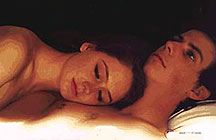|
|
|
|
The
Nostradamus Kid
|
 |
|
The Nostradamus Kid is one of those Australian movies which is more fun to argue about than to actually watch. Partly this is because of Ellis' stated indifference towards the craft of film directing – only the tenth most important ingredient in a successful movie, he reckons (below a solid script, canny casting, hiring a good DOP and editor ...). This indifference shows: although it is his third film as a director, Ellis pays scant attention to visual style, story rhythm or proper guidance of the actors' performances. The script is indeed the thing in The Nostradamus Kid. Ellis has often publicly placed himself in a tradition headed up by François Truffaut and Preston Sturges – neither of them, for most of their careers, showy, flashily visual directors. The references are astute. Ellis emulates Truffaut's Antoine Doinel cycle starring Jean-Pierre Léaud – and has announced his intention (so far unrealised) to continue his screen autobiography with Noah Taylor as his alter ego – by making a bittersweet, largely autobiographical film; anyone even slightly familiar with the Ellis oeuvre will recognise many of the individuals, incidents and attitudes portrayed. Meanwhile, he also mimics Sturges' flair for brittly humorous one-liners and socially dynamic ensemble interaction. Whatever its shortcomings, the film demands to be taken, warts and all, as Ellis's testament to himself and his distinctive sensibility. Ken Elkin (Taylor) is a Nostradamus kid because, twice in his young life, he becomes obsessed with the notion that an apocalypse is imminent – firstly as a tormented soul at a Seventh-day Adventist camp in 1956, and secondly as a Sydney University student during the Cuban missile crisis of 1962. In both periods, Elkin fixates on dream-women: the shy Esther (Alice Garner) and the privileged Jennie (Miranda Otto). It is easy to take The Nostradamus Kid as a fairly straightforward exercise in misogyny. It tells a familiar story, a kind of Australian variation on a model Charles Bukowski fiction. Its key elements are a ragged bohemian hero whose deepest personal relations are with other blokes and the enigmatic women in his life who are rich, moralistic and treacherous, but endlessly desirable. Add to this brew a few stern, castrating father figures, loose jokes about rape, and a best friend (Jack Campbell) who is also Ken's principle sexual rival, and you have one whopping great male fantasy of a movie. Ultimately, however, the film's tone is more maudlin than aggro. Scenes in which Ellis allows Ken to castigate his enemies ("history will judge you harshly") or to receive fulsome praise from women ("you do it better than anyone") are welcome moments of ironic self-mockery. There is an uncharacteristically defensive note, a nervous nod to feminist enlightenment in the scene – extremely clumsily directed – in which Ken, absorbed as usual in himself and his own angst during the act of love, does not realise that Jennie has just had her first orgasm. Ellis mainly indulges a different sort of male fantasy: the sad song of the eternal Little Boy Lost, forever mourning the passing of time and the waste of life's unfulfilled potentials. Such pathos can be found everywhere in those works of Australian culture created by men: we see variations of it in the writing of Barry Dickins and the film and television work of Brian McKenzie. In Ellis' work across several media, this emotion has a boozy, bitter, wilfully politically incorrect edge to match the tear-soaked nostalgia and regret. Watching the increasingly pained contortions of this uniquely Aussie tradition in The Nostradamus Kid, one can only wonder whether it is fast approaching its historical and cultural use-by date. © Adrian Martin December 1994 |
![]()